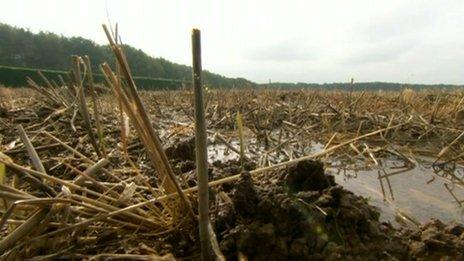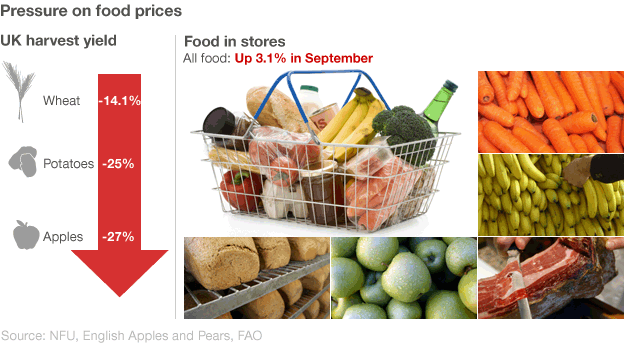Wet weather set to hit UK food prices
- Published

The UK saw its wettest summer for a century, Met Office figures have shown
Food prices look set to rise after poor UK harvests due to recent wet weather.
The National Farmers' Union (NFU) said wheat yields in England were down by almost 15% on the five-year average, with productivity down to 1980s levels.
The British Retail Consortium said food prices were already being driven up after a rise in grain costs following the worst drought in 50 years in the US and a heatwave in Russia.
Poor UK harvests also mean smaller fruit and vegetables than normal.
This summer was the second wettest in the UK since records began, Met Office figures indicated. The only summer - defined as June, July and August - which was wetter since national records began was in 1912.A drought across much of England during the spring followed by record-breaking wet weather has meant a poor wheat harvest for many farmers, the NFU said.
Figures suggested wheat yields were down by 14.1% - but some farmers in the wet western half of England reported even lower yields.
Wet weather affects not just the size of the harvest but also the quality. Low quality wheat ends up as animal feed, leaving less high quality wheat for baking which raises the price of bread. Not all bakers use British wheat, so price changes may vary across producers.
Enough English apples will be picked this year to supply grocers and supermarkets until the end of the year. But the smaller harvest will push up prices, especially on traditional English varieties like cox and russets.
The biggest influence on the price of meat is the international price of grain. Up to half of the cost of raising a pig is the grain used for feed. Wheat prices are up around 30% compared with a year ago, following droughts in the US and Russia.
Bad weather in key producing areas worldwide has pushed up the price of fruit some 34% in five years. Public health experts are concerned that higher prices will see consumers cutting back on healthy eating options.
Root crops have suffered from the wet summer, with harvests delayed by cold weather or crops spoiled in waterlogged ground. Some vegetables are smaller than usual, or their flavour has been affected - for example carrots taste less sweet this year.
'Soul destroying'
NFU President Peter Kendall said: "There are many farmers who are down 25 to 30% on the wheat crop.
"In some cases you looked from the outside and you thought, this crop will do over four tonnes to the acre - and it's been struggling to do three and some cases two tonnes to the acre.
"It's been soul destroying for the farmers growing the crops."
Mr Kendall said the increase in the global price of wheat - by some 30% over the past 12 months - was also putting pressure on farmers who buy grain to feed their livestock.
He said: "The challenge for the pig and poultry market is trying to make sure that retailers pay a fair price, because in pigs 50% of the cost is grain, poultry it's 60% - and these farmers at the moment, because the prices haven't responded yet, they're actually saying I'm not going to fill my sheds with poultry or pigs any more."
The problems faced by farmers in the UK and the global increase in wheat prices are both adding to fears over rises in food prices.
Richard Dodd, of the British Retail Consortium, said: "Whilst retailers are certainly doing all they can to protect customers from the full impact of that, of course some of that inevitably will impact on shop prices."
The extreme weather has taken its toll on the amount of food produced and the quality of food and grain.
Martyn Jones, from the Morrisons supermarket chain, said that, for example, carrots were not quite as sweet as previous years, and the available volumes of some food was down - about 25% across most potatoes and root crops.
He said consumers would also see smaller fruit in the shops, and yields of fruit were also down.
'Challenging time'
Ian Johnson, south-west England spokesman for the NFU, said this year's weather had led to a "mixed picture" for arable farmers.
He said while wheat crops had suffered, winter barley yields were up 1.6%; spring barley yields were down 7.4% and oilseed rape yields were up 5.9%.
Mr Johnson said fruit and vegetable crops had also been affected, with potatoes and apples particularly badly affected.
The adverse conditions cause blight, mildew and disease to get into crops, he said.
Mr Johnson said that if a pattern of winter drought followed by unexpected huge amounts of rain continued then it would have to be addressed by changes in technology or farming techniques, such as planting in different ways or at different times.
"Farmers will engage in this provided they will see realistic returns but if they don't then they are not going to," he said.
But he said retailers also needed to have sufficient provision to cushion farmers during such times.
Farmer Jo Tomlinson: "Animal feed is our single biggest cost"
'Research neglected'
Paul Harris, an arable farmer in Dorset, believes the difficult times may be set to continue.
He said: "I've been farming now for 40 years and it's the worst harvest I have ever known.
"There has always been a seed time and a harvest. This year's harvest has been done, but I'm just so worried about seed time. It will come round but we've just got to work with it and fight with it."
The bad weather is also affecting the UK's wine industry - award-winning West Sussex vineyard Nyetimber is not harvesting its grapes because the quality and volume of the fruit is not up to standard.
Environmental group Friends of The Earth predicts that the situation will deteriorate in the years to come due to global warming.
Spokeswoman Vicki Hird said: "Climate change is already damaging food production and causing prices to soar - and the situation is expected to get worse without urgent action to slash emissions.
"Our agricultural system is also in desperate need of overhaul to meet the twin challenges of feeding a growing world population and protecting the planet."
Former government food advisor, Lord Haskins, warns that agricultural policy and practices must adapt to the changing conditions.
He said: "Research into food development has been neglected for a number of years, partly under pressure from people who don't think that, for example, genetically modified food is a good thing.
"We have to make sure that those lobby groups who've opposed scientific research don't run the game from now on - science has got to come into its own."
- Published10 October 2012
- Published10 October 2012
- Published4 October 2012
- Published10 August 2012
- Published30 August 2012
